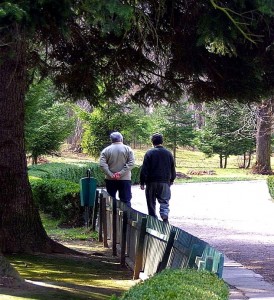
When I was growing up, one of the questions always asked when two people began dating was, “Is she/he Catholic?” It was quite rightly assumed that differences in religion within a marriage could be a major source of stress and potentially lead to break-up of the marriage. In those days, we were just barely past the time that “mixed marriages” took place at the rectory or in the vestibule, and the non-Catholic partner had to promise to raise the children Catholic before a marriage could be blessed. Presumably, sharing the bonds of a common religion would serve to strengthen the marriage.
Imagine my surprise, then, when I married a Catholic man of Mexican ancestry and discovered that we were divided by the bonds of a common religion. Many aspects of his cultural experience of Catholicism were different from the Irish-German Catholic experience of my childhood. (And no, the German Catholic side were not converts. They had been Catholic for centuries.)
Things we found that differed ranged from the relative importance of certain feast days (those of Our Lady were never to be missed) to questions as “serious” as Friday abstinence (could one eat gravy served on potatoes at a restaurant on a Lenten Friday?).
Fortunately, we were both graduate students in Anthropology and had a vocabulary with which to discuss and appreciate the cultural differences over which we were tripping. Feasts of Our Lady are extremely important in Hispanic culture and, as Our Lady of Guadalupe, she is trusted to handle any and all problems that arise. Friday abstinence from meat has been somewhat optional within Spanish speaking culture since the time of the Crusades. The male head of household had the prerogative to excuse the family from following the rule of abstinence. So the question of gravy on potatoes was moot! Simply a minor cultural difference in the experience of faith and definitely not something requiring confession. (Further research done in the course of writing this post indicates that meat based gravy was never actually prohibited, but general understanding of the rules within my culture of origin excluded it.)
This all came to mind again in the past couple of weeks. One of our daughter’s classmates is also Catholic, from a somewhat more traditional family than ours. On Ash Wednesday, the friend ruefully confessed that she had already forgotten and had a piece of candy that day. She had intended to give up candy for Lent. As it turned out, she had also forgotten (or perhaps never realized) that Ash Wednesday is a day of abstinence. She had packed a wonderful turkey sandwich for lunch that day. When apprised of the fact, she looked at the sandwich, declared, “Well, it would be a shame to waste it,” and ate her entire lunch.
When I was their age, the poor sandwich would have been returned to its wrapper and taken home for another day, or perhaps even thrown away. Some might have chastised the young woman for breaking a Church rule and eating the sandwich. She probably would have felt the need to confess her sin. Blessedly, she does not seem to have such worries today.
So a few questions arise. How do rules fit into our experience of faith? Why even have rules of fast and abstinence if they aren’t going to be taken extremely seriously? How can religious rules be applied to one group of people and not another? That’s not fair! Aren’t there more important things to worry about than what people eat and when? Should religions have rules at all?
In looking at religion and behaviors associated with religion, Clifford Geertz‘ insight, in “Religion as a Cultural System,” that religion serves both as a model of society and a model for society provides a useful platform for analysis. Religions all around the world have codes of behavior — expectations of how people will act and for what reasons they will act as they do. These codes are normally posited to be the will of the deity. Generally, they uphold the social structure of the society and provide the rationale for the way social interactions occur. The song, “Tradition,” from the musical, Fiddler on the Roof, is an excellent example of the structuring of such social expectations and the recourse to God as their source.
This works pretty well when the religion in question is a small, localized one with a limited number of adherents. With groups that are larger and spread out over a larger geographic area, modifications begin to be seen. As Christianity spread out through the Roman Empire, accomodations were made to make it more understandable to peoples with different geographical, economic and cultural realities. If evergreen boughs are a symbol of everlasting life in a culture, for example, it’s a short jump to include them as symbols in Christian settings as well. But if evergreens mean nothing in a culture, they will often mean nothing in liturgical settings either. For this reason we are careful what we include in liturgy that must of its nature be open to be experienced cross-culturally.
The underlying reason for a practice is also important in analysis of how that practice plays out in the lived experience of a people. If the underlying reason is that there must be atonement for one’s failings, a penitential reason, then denying oneself something good but not necessary for life is often valued. If growth in self discipline is an underlying reason, again, denying oneself something makes sense. If one’s salvation from a nearly eternal cycle of birth and rebirth requires attaining perfection or enlightenment in this life, such practices again make sense. If the reason is that we choose to enter into a time and process of transformation of who we are so that we can be more open to meet our God when He comes, then it again makes sense.
Most religions and “spiritual” movements or quests require their adherents to make sacrifices during certain seasons or as part of their daily life. There is a recognition that we are not perfect and we do not live in a perfect world. It takes work to make things better and to become better persons. We only grow through difficult experiences, not when all is easy. So times of prayer and fasting and giving alms are commonly found.
The trick in all of this is to keep things in perspective. What is a more serious offense, eating meat on Friday, for example, or betraying a friend? Is it more offensive to God and the community to miss Mass on Sunday because guests arrived unexpectedly or to turn away the guests because one has to get to church? Should we look to larger issues of how we use resources locally and globally in planning the forms our fasting and almsgiving will take? How do our religious beliefs lead us to act in our communities and countries? How do we weigh the relative importance of the wide variety of issues that must be addressed by our representatives when we decide who will represent us in government? Can people of good will take different positions and still be part of our community?
It seems to me that all of these questions and more are reflected in the simple decisions we make about things like abstaining from meat on Friday or wasting the food that has been prepared for us. Some things are simply matters of traditional practice and can vary from place to place or family to family. Others are fundamental issues that go to the heart of our relationship with God and creation. Nevertheless, we must be gentle with each other in addressing them. God does not go around bashing people over the head and we must not either. If our religious beliefs and practices do act as models of the societies in which we live and models for what those societies should be like, and in my experience they do, then let’s be careful to use them to shape a society in which God’s “little ones” are protected and supported, people are free to ask questions, think for themselves, and grow in wisdom, age and grace, and the resources we have been given can be used wisely to benefit all of God’s creatures, human as well as non-human.
Just as my husband and I found we were divided by the bonds of a common religion, humans are divided by the bonds of our common human habit of designing social systems to meet the environment in which we find ourselves and the perception of reality that goes with and shapes those systems that we design. Only by accepting each other in love, giving up the attempt to change the other into our own image and culture, and laughing a lot as we go along can we be transformed so we are ready to meet the Lord who comes to us telling stories and trusting in His Father’s bounty and love to sustain Him.
Read More









 Concluding Prayer
Concluding Prayer












